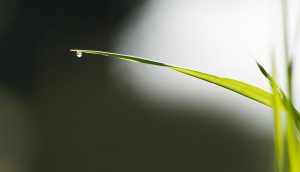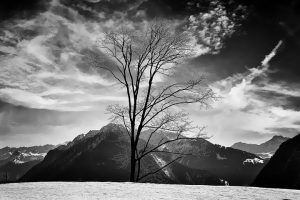Tuesday
Arts and PoetryThe Hill of Hua-Tzu
Commentary on a poem expressing deep wisdom and compassion
by Noel McLellan
Hua-Tzu Hill
Wang: The birds fly away
into infinite space:
Over the whole mountain
returns the splendour of autumn.
Ascending and descending
Hua-tzu hill,
I feel
unbounded bewilderment and lamentation.
P’ei: The sun sets,
The wind rises among the pines.
Returning home,
there is a little dew upon the grass.
The reflection of the clouds
falls into the tracks of my shoes,
The blue of the mountains
touches my clothes.
Vital contemplations course through the simple words of Hua-Tzu Hill, spoken as poetic dialogue between the two friends, Wang and P’ei. To taste the kindness in these words is to enjoy fresh tea in the company of immortals. Wang Wei was a poet, painter, and statesman of T’ang dynasty China, and P’ei Ti was his friend, a younger man, also a poet and student of the classics. A sparse discourse in poems and letters survives them, revealing a subtle appreciation of nature as well as an investigation of reality that is somehow both intense and effortless.
 Wang’s opening is modest and profound. Not wasting time with small talk, he gestures directly to the heart of things: “The birds fly away into infinite space.” When we look with honest eyes, each perception, each thought, each moment, each life, vanishes without a trace. Peering deeply within, looking intently without—all that we perceive is already gone. As Chögyam Trungpa Rinpoche wrote,“Good, bad, happy, sad—all thoughts vanish into emptiness like the imprint of a bird in the sky.” It is, perhaps, so lonely. Infinite space gives us nothing to hang onto, nowhere to find our home.
Wang’s opening is modest and profound. Not wasting time with small talk, he gestures directly to the heart of things: “The birds fly away into infinite space.” When we look with honest eyes, each perception, each thought, each moment, each life, vanishes without a trace. Peering deeply within, looking intently without—all that we perceive is already gone. As Chögyam Trungpa Rinpoche wrote,“Good, bad, happy, sad—all thoughts vanish into emptiness like the imprint of a bird in the sky.” It is, perhaps, so lonely. Infinite space gives us nothing to hang onto, nowhere to find our home.
Nevertheless, we see and feel. This empty world is beautiful, full of energy and color, like the overwhelming “splendour of autumn.” And yet, touching this co-emergent truth, empty and luminous, does not simply bring us ease and joy. We have been nurturing our story of self for so long, grasping after the slippery narrative of ordinary life’s loves and hates, losses and gains. Finding ourselves here, at the sword edge of wisdom, we feel like a gutted fish. We walk up and down the hill of daily life. We wake up and get dressed, we go to work, we eat, we go to sleep, yet there is no center, no fringe—only ghastly nothingness that devours everything. In this life to be ignorant is to suffer, to awaken is to be alone. Beautiful yet terrifying, flowing from an empty heart—unbounded bewilderment and lamentation. How trusting of Wang to share these feelings.
 Now P’ei walks a perilous path. His gentle friend is not challenging him. Yet only a genuine master, or a true human being, could answer Wang’s words. Like Vimalakirti, Wang has already invoked the very nature of wisdom-emptiness and wisdom-luminosity. He can’t be pushed or pulled, yet we must go further. How to climb higher from the top of a 100-foot pole? P’ei brings him lovingly back down to earth. Leaving behind even the scent of philosophy, he expresses now: the sun setting, the wind among the pines, this walk home, the dew upon the grass. We can search the earth for sublime teachings, but we only come home in the ordinary magic of now. In this very illusion, in this very life, in this very moment, there is an undeniable goodness. This goodness is just so—beyond words. It disrupts concepts, flowing into the space of true perception. It is ephemeral as the reflection of the clouds, yet right here, in our footprints. When we touch that goodness, or allow ourselves to be touched, we feel our totality and inseparability, like the gentle caress of the blue mountains.
Now P’ei walks a perilous path. His gentle friend is not challenging him. Yet only a genuine master, or a true human being, could answer Wang’s words. Like Vimalakirti, Wang has already invoked the very nature of wisdom-emptiness and wisdom-luminosity. He can’t be pushed or pulled, yet we must go further. How to climb higher from the top of a 100-foot pole? P’ei brings him lovingly back down to earth. Leaving behind even the scent of philosophy, he expresses now: the sun setting, the wind among the pines, this walk home, the dew upon the grass. We can search the earth for sublime teachings, but we only come home in the ordinary magic of now. In this very illusion, in this very life, in this very moment, there is an undeniable goodness. This goodness is just so—beyond words. It disrupts concepts, flowing into the space of true perception. It is ephemeral as the reflection of the clouds, yet right here, in our footprints. When we touch that goodness, or allow ourselves to be touched, we feel our totality and inseparability, like the gentle caress of the blue mountains.
 Noel McLellan is a second-generation Buddhist and an acharya (honored teacher) in the Shambhala lineage. He teaches English and History at the Shambhala School in Halifax, Nova Scotia, where he lives with his wife and two young children.
Noel McLellan is a second-generation Buddhist and an acharya (honored teacher) in the Shambhala lineage. He teaches English and History at the Shambhala School in Halifax, Nova Scotia, where he lives with his wife and two young children.
Poem translation by C.J. Chen and Michael Bullock






Jun 25, 2017
Reply
Acharya McClellan,
Thank you for this contemplation on these Chinese Contemplative poets. The aboriginal ” motherlode” source for the contemplative arts tradition is some of the Chinese Artists. They found a “seam” and ” Way” between the artistic aspects of both Taoism and Buddhadharma( in particular Chan/Zen) Although they were conversant with – and often deep practitioners – Taoism and the Buddhadharma they discerned another and separate way with the Way: the Contemplative. In pragmatic terms this Contemplative Way is more available to ordinary people in ordinary circumstances. In Shambhala terms the Contemplative is the Way of Ordinary Magic.
Jun 23, 2017
Reply
Exqusite!
Thank you so much for this commentary, Noel. Having just returned from my first trip to Washington’s Olympic Peninsula and Vancouver Island, BC, I’m reeling with both joy and “lamentation.”
Vicki Giella
Jun 22, 2017
Reply
Acharya McLellan,
Thank you for sharing your insights and depth of poetic non-poetry. After pointing out
the beet dip taste sensation to you last night while departing Mid-Summers Day’s
amazing feast at Halifax’s Black Rock Beech; awaking first thing this AM to our mutual
respect of unendingly fleeting moments amongst impenetrable nothingness, I feel
stangely inseparable from you and all sentient kind…
I will reflect again and again on your precious piece – keep on teachin’ brother!
May all awake to human connection,
Scott Forbes